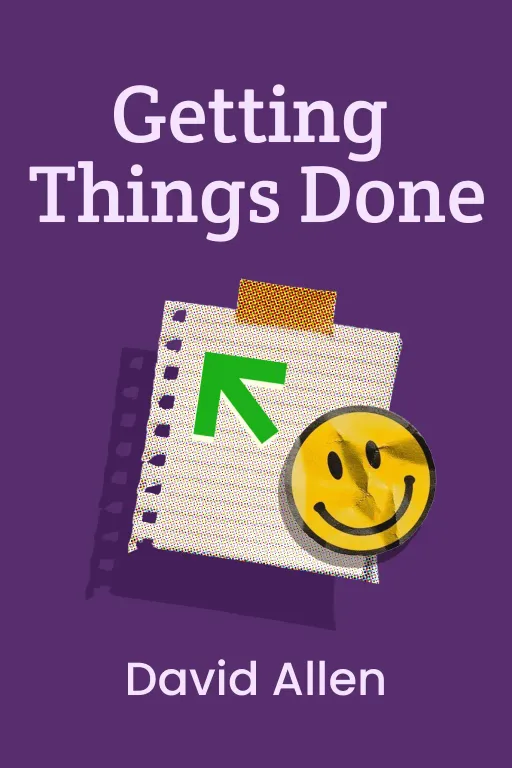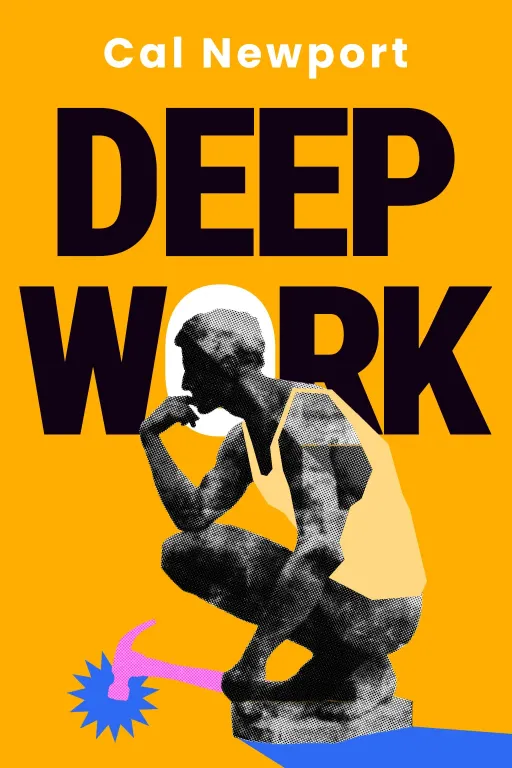
Dad Brain, Decluttered: Getting Things Done When You're a Parent
8 minGolden Hook & Introduction
SECTION
Nova: Collins, picture this: you're on the floor, you're building the most epic LEGO castle of all time. Your kid is totally into it. And then, out of nowhere, your brain screams, 'DID YOU REMEMBER TO TAKE THE CHICKEN OUT OF THE FREEZER?!' And just like that, the magic is gone.
Collins: Nova, are you spying on me? That's my Tuesday. And my Wednesday. And definitely my Thursday. It’s like my brain has these little pop-up ads for anxiety that show up at the worst possible times.
Nova: Exactly! That feeling, that constant, low-level hum of forgotten tasks, is the secret enemy of great parenting. David Allen, in his book 'Getting Things Done,' calls these 'open loops,' and he argues they're the single biggest drain on our energy and focus.
Collins: Open loops. I like that. It sounds way more official than 'the swirling vortex of doom in my head.'
Nova: It is! And we're going to learn how to close them. So today, we're going to tackle this from two angles. First, we'll expose that real enemy: the mental clutter monster living in your head. Then, we'll roll up our sleeves and build a 'Dad-Cave for the Mind,' a simple, five-step system to finally get organized and get your focus back.
Collins: A Dad-Cave for the Mind! I'm in. Does it come with a mini-fridge?
Nova: We can work on that. But first, let's talk about that monster.
Deep Dive into Core Topic 1: The Mental Clutter Monster
SECTION
Nova: So, the core problem Allen identifies is that our brains are amazing at ideas, but they are a terrible, terrible office for them. Every time you think, "I need to..." or "I should remember to..." and you don't write it down, you create one of those 'open loops.'
Collins: And each loop is like another tab open in my brain's internet browser. After a while, the whole system just slows down and crashes.
Nova: That's the perfect analogy! And your brain doesn't care about what's important. It just knows something is unfinished. Allen tells this great little story in the book about a flashlight with dead batteries.
Collins: Okay, I'm listening.
Nova: Imagine you have a flashlight, and you know the batteries are dead. Your brain doesn't helpfully remind you to buy batteries when you're walking past them in the grocery store. No, that would be too easy.
Collins: Of course not. That would be logical.
Nova: Instead, your brain reminds you about the dead batteries at 2 AM when the power goes out and you're stumbling around in the dark. It reminds you when you can do absolutely nothing about it. It's a terrible assistant!
Collins: That is brilliant. And it's so true. My 'dead batteries' are things like, 'RSVP to that kid's birthday party,' 'research summer camps,' 'figure out what that weird smell in the car is.' They don't pop up when I'm at my computer; they pop up when I'm trying to read a bedtime story.
Nova: And that's the cost, right? It pulls you out of the present moment. Allen has this quote that I think will hit home for you: "There is usually an inverse proportion between how much something is on your mind and how much it's getting done."
Collins: Whoa. Say that again.
Nova: The more something is on your mind, the less likely it is that it's actually getting done. Because it's just spinning in your head instead of being translated into an action.
Collins: Okay, that's a huge 'aha!' moment for me. I always thought the goal was to get better at remembering all the things. So you're telling me the goal isn't to more, it's to have to remember?
Nova: Precisely! The goal is to get it all out of your head and into a system you trust, so your brain can do what it's best at: being creative, solving problems, and, you know, coming up with a really awesome voice for the LEGO dragon.
Collins: My LEGO dragon voice is legendary. But it's hard to be legendary when you're also worried about your car's registration.
Nova: I hear you. And that's where our next idea comes in. It's time to build your Mission Control.
Deep Dive into Core Topic 2: Building Your Dad-Cave for the Mind
SECTION
Nova: So, the way we get to that state of what Allen calls 'mind like water'—or what we're calling 'Dad Brain Zen'—is by building a system we trust more than our own brain. He breaks it down into five simple stages, but let's just call it 'Building Your Dad's Mission Control.'
Collins: Okay, Captain Collins reporting for duty. What are the steps?
Nova: It's Collect, Process, Organize, Review, and Do. But let's not get bogged down in all five. Let's focus on the two that will give you the biggest win, right now. The first is.
Collins: Collect what? Dust bunnies? Half-eaten granola bars from under the car seat?
Nova: Yes, probably those too. But mostly, you collect every single open loop. Everything that's on your mind. You get it ALL out of your head and into one place. An 'in-basket.' This could be a physical tray on your desk, a page in a notebook, or a list in an app. The tool doesn't matter. The habit does.
Collins: Okay, I can see the appeal. But 'Collect.' My 'in-basket' is my entire house. My car is an in-basket. My jacket pocket is an in-basket. Where do I even start?
Nova: You start with what's in your head. Allen calls it the 'Mind Sweep.' And it's so simple. You take a pen and a piece of paper, and for 15 minutes, you write down every single thing that has your attention. 'Buy milk.' 'Call mom.' 'Figure out retirement plan.' 'Apologize to my kid for being grumpy yesterday.' 'Become the best dad ever.' No filter. Just get it out.
Collins: That sounds both terrifying and incredibly relieving.
Nova: It is! It's like dumping out a junk drawer. It's a mess at first, but for the first time, you can see everything you're dealing with. And once you've collected, you can move to the second magic step:. And this is where we find the dad superpower.
Collins: A dad superpower? I need one of those.
Nova: It's called the. It's so simple. As you look at your list, if any action will take you less than two minutes to complete, you do it right then and there.
Collins: Wait, you don't write it down on another list? You just... do it?
Nova: You just do it. The logic is that it would take you longer to log it, track it, and review it than it would to just get it done. Think about it. That email you need to reply to with a simple 'Yes, sounds good.' The dirty cup you walked past on the counter. The toy that needs to be put back in the bin.
Collins: So when I see the cup on the counter, instead of the internal monologue of 'I should move that cup... someone should move that cup... why is that cup still there?'... I just... move it? And that's a productivity win?
Nova: It's a huge win! Because you've closed the loop. You've eliminated a piece of mental static. You're not just cleaning; you're freeing up brain space. Imagine doing that 20 times a day. That's 20 fewer open tabs in your brain.
Collins: That... that actually sounds life-changing. It's so simple it's almost insulting. But I can totally see how that would add up. It's like my whole life is a series of two-minute tasks I've been putting off for two weeks.
Nova: And that's what creates the feeling of being overwhelmed! It's not the one big project; it's the thousand tiny, unmade decisions. The Two-Minute Rule is your secret weapon against that.
Synthesis & Takeaways
SECTION
Nova: Okay, so let's land the plane here. We've learned two huge things from 'Getting Things Done' today, translated for the noble art of fatherhood.
Collins: I'm ready. Hit me.
Nova: One, our brains are for creating, not for storing. All those open loops—the mental pop-up ads—are draining our 'dad-energy' and stealing our presence. The enemy is the clutter in our own heads.
Collins: Check. My brain is a terrible, horrible, no-good, very bad office. Got it.
Nova: And two, we can fight back! By building a simple external system—even just a notebook—to capture everything, and by using powerful tricks like the Two-Minute Rule, we can close those loops and get our energy back.
Collins: It’s not about becoming a productivity robot; it’s about setting up a system so you can stop thinking about the boring stuff and be more human. More present.
Nova: That's it exactly. So, what's the one thing you're taking away from this? The one thing you're actually going to try?
Collins: Okay, so here's the challenge for me, and for everyone listening. Forget the whole five-step system for a second. That feels like a lot. Let's just do one thing this week: the 'Mind Sweep.'
Nova: I love it.
Collins: Seriously. Take 15 minutes. Lock yourself in the bathroom if you have to. Get a piece of paper and a pen. And write down every single thing that's bugging you, big or small. 'Fix the squeaky door.' 'Plan a date night.' 'Figure out what I want to be when I grow up.' Just get it all out of your head and onto paper.
Nova: That is the perfect start.
Collins: Right? That's the first step to decluttering the dad brain. Just seeing it all in one place feels like the beginning of getting control.
Nova: It is. It's not about adding more work; it's about clearing the decks so you can focus on the real work: being an awesome, present dad whose legendary LEGO dragon voice isn't interrupted by thoughts of defrosting chicken.
Collins: To legendary dragon voices, and less mental clutter. I'll drink to that. Or, you know, put 'buy juice boxes' on a list.
Nova: And if it takes less than two minutes, just add it to the online cart right now.
Collins: Mind. Blown.









